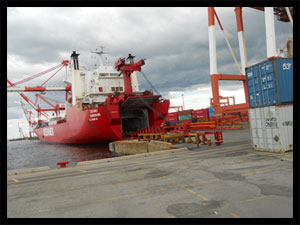An Update on the Great Lakes International Trade and Transport Hub (GLITTH) Initiative 2019 - 2021 Overview
The Great Lakes International Trade and Transport Hub (GLITTH) Initiative was developed while research on the feasibility of building a “Detroit-Windsor International Trade Crossing” was being conducted. It was an initiative that developed out of a large conference first gathering at Michigan State University in East Lansing and then the next year at Dalhousie University in Halifax. Eventually a memorandum of understanding was created between the universities and involved business and policy leaders on both sides of the border.
GLITTH was intended as a cross discipline, cross sector network to study the economic impact of a new international crossing and any changes in the pattern of trade that might take place as a result. Additionally, we studied what policies might be better mainstreamed to improve the efficiency, speed, and safety of cross border trade. Findings generated support and create momentum for building what would later be named as the Gordie Howe Bridge. GLITTH focused on a joint effort between the Midwest U.S. and Canada to leverage assets of the shared region and capitalize on the connectivity between them. These assets include the Great Lakes, supply chain infrastructure, world class universities, land and agricultural resources, and industry strengths such as advanced manufacturing.
Active participants were engineer and business scholars, social scientists and policymaker along with the private sector. Since the construction of the Gordie Howe Bridge has begun, several organizations have sprouted to support the development and to envision its economic impact with the business sector in the lead. As not to duplicate efforts, GLITTH became a communication network to link the various audiences and inform stakeholders of business, policy, and research needs as well as updates. GLITTH members supported the growth and evolution of other groups in the business and policy sector, and have these groups have funded related research efforts.
Currently, GLITTH is being absorbed into the Center’s other infrastructure and trade-related activities. The center holds membership in the advocacy groups such as the Council of the Great Lakes Region (CIGLR), the Canada U.S. Business Association (CUSBA), and the Canada United States Law Institute (CUSLI).
 The GLITTH Initiative is a joint effort between the Midwest U.S. and Canada to leverage assets of the shared region and capitalize on the connectivity between them. These assets include the Great Lakes, supply chain infrastructure, world class universities, land and agricultural resources, and industry strengths such as advanced manufacturing. At the core of this effort is multifaceted network that is motivated to see this regional partnership refine their assets to become an economic force in today's global economy. Members of the GLITTH network share information and connect resources to advance regional business investment, job creation, environmental sustainability, and economic vitality.
The GLITTH Initiative is a joint effort between the Midwest U.S. and Canada to leverage assets of the shared region and capitalize on the connectivity between them. These assets include the Great Lakes, supply chain infrastructure, world class universities, land and agricultural resources, and industry strengths such as advanced manufacturing. At the core of this effort is multifaceted network that is motivated to see this regional partnership refine their assets to become an economic force in today's global economy. Members of the GLITTH network share information and connect resources to advance regional business investment, job creation, environmental sustainability, and economic vitality.
Example Focus Point: There is immense freight traffic to and from the Port of Halifax through the Detroit and Port Huron gateways. These two crossings, when combined, make southeast Michigan the largest international trade gateway in the country, yet only 6% of that traffic stops in the state. A freight hub near these crossings would give reason for the freight to make a stop in Michigan, through both direct and indirect means, and create over 66,000 jobs in the larger region.
The Great Lakes International Trade and Transport Hub (GLITTH) is a project to capitalize on the immense freight traffic to and from the Port of Halifax through the Detroit and Port Huron gateways. These two crossings, when combined, make southeast Michigan the largest international trade gateway in the country, yet only 6% of that traffic stops in the state. A freight hub near these crossings would, through both direct and indirect means, create over 66,000 jobs in the region.
But it isn't just the Detroit-Flint-Lansing triangle that stands to gain: despite a lack of exposure and public awareness, Michigan's agricultural sector is booming, and the ability to get commodities to market more quickly, both domestic and international, will help agribusiness and other industry vital sectors across the rural areas of the state. Further, easy access to transit and freight routes will induce logistics and manufacturing jobs throughout the state
When combined, the border crossings at Detroit and Port Huron render Southeast Michigan the largest international trade gateway in the country, yet only 6% of inbound freight stops in the state, constituting a tremendous missed opportunity. Created to address this gap and bring jobs to the region, the GLITTH initiative is a multi-organization, multi-sector, multi-region, multi-national effort to transform the U.S. Midwest states of Michigan and Ohio into a global freight and logistics hub that connects and coordinates with Canada’s provinces of Ontario and Nova Scotia. To accomplish its larger goal of economic vitality, GLITTH seeks to advance infrastructure, talent, and public education programs related to global trade while advocating policies to facilitate such programs and create jobs. Furthermore, GLITTH is inclusive, collaborative, and action-oriented. The GLITTH Network extends throughout the U.S. Midwest and Canada with expertise from a broad range of skills and professions.

Michigan State University's Canadian Studies Center and Dalhousie University's Centre for Trade and Transportation Innovation brought key economic developers, trade and transportation experts from the U.S. Midwest and Canada to Halifax, Nova Scotia in June 2011. There an exchange built strong momentum for regional collaboration on trade and the export economy. The connections made there encouraged University faculty, Halifax leaders, the Prima Civitas Foundation, the Michigan Economic Development Corporation, the Michigan Department of Transportation, and many others including Next Michigan Partners, Foster Swift (P3 Team) and the Detroit Regional Chamber to help further examine facets of the infrastructure and supply chain that will help develop a truly bi-national export/import strategy. These and other participants formed the Great Lakes International Trade and Transport Hub (GLITTH) Initiative charged with examining and developing such a strategy.

Michigan State University's Canadian Studies Center and Dalhousie University's Centre for Trade and Transportation Innovation hosted a conference in Halifax, Nova Scotia, Canada in June 2011, to discuss freight transportation and trade issues between Nova Scotia and the Great Lakes Region (particularly Michigan) that lend to economic development opportunities. That gathering led to the creation of the Great Lakes International Trade and Transport Hub initiative, which serves as a collaborative bi-national, multi-state chartered organization.
Global Trade and Transportation: Next Steps
June 19-21, 2011
Dalhousie University and Michigan State University

Developing an Action Agenda
On October 16 - 18, 2011 Michigan State University, Dalhousie University and Prima Civitas Foundation hosted a summit on the campus of Michigan State University to develop an action agenda for increasing trade between the U.S. Midwest and Canada.
The Summit discussion was organized around five agenda topics and we have added two additional topics as a result of the Summit discussion. They include Business and industry collaboration; Asset and infrastructure integration; Workforce, talent, and education alignment; Policy transformation; Marketing and public education, and added topics; Capital access, and Organization.
Resources
AnnMarie Schneider
Michigan State University
David Closs *
Business Research Chair
Michigan State University, Supply Chain Management
Roger Hamlin *
Capital Access Chair
Michigan State University, Institute for Public Policy and Social Research
Michelle Strobel *
Communications Chair
Michigan State University, College of Social Science
Marietta Baba
Finance Chair
Michigan State University, College of Social Science
Members at Large
Daniel Casey *
Economic Development Alliance of St. Claire County
Carolyn Gawlik
TransLinked
Detroit Regional Chamber of Commerce
Janice Karcher *
Genesee Regional Chamber of Commerce
David Lick *
Foster Swift Collins & Smith PC
Dawn Pysarchik *
Michigan State University, International Studies and Programs
Fred Rodammer
Michigan State University, Supply Chain Management
Justin Sprague *
Genesee Regional Chamber of Commerce